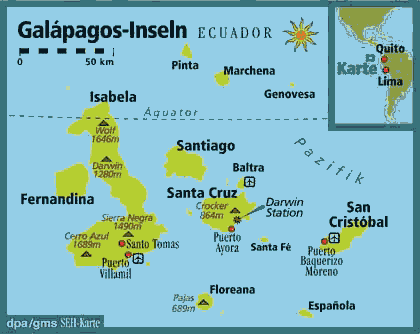
Well, I´m sitting in an internet cafe in Baños, its raining out and I´ve got a little bit of time so I think I need to reflect a bit more on my time in the Galapagos.
First, I must say. It is an incredible place. The animals there are unlike animals anywhere else. Each island has its own set of sub-species based on the food available.
The Darwin´s finch has 20 different species with beaks that grow based in if they eat from trees, cactus, the ground, or the sea. Evolution is an amazing thing.
An even more amazing thing was the amount of tourists there-- predominantly American or European.
We arrived and were stunned to find a city with hundreds of boats in the harbor, in a place that we knew of for its wilderness.
The UNESCO just recently identified the Galapagos as one of the most endangered wild places in the world and here´s why:
Thousands, and I mean thousands of people arrive there each day from all over the world. And they all come for similar reasons. They want to see the turtles, the sea lions, the boobies (blue footed ones). But they don´t think about the impact they might be having--just as I did´nt think about it.
As we disembarked to our first island,I saw a crowd of Safari outfitted gringos with telephoto lenses like guns pointed two feet away at the face of a baby sea lion. Up and down the beach there were more groups surrounding the sleeping Lobos Marinos. With a male barking at them from thewater I realized, the animals may not have many predators, and we are taught that they don´tmind humans in their face, but we humans (once again) are their most vicious predators.
Animals accostomed to human contact on the Galapagos have no place to hide. Think of someone walking into your house and taking pictures of you while your eating breakfast. You probably won´t bite them or run away, but when theykeepcoming in hordes, you willwant to run and hide.
In the Galapagos there is control, only 80 boats can be there with tours, but in corrupt country such as ecuador (or the US for that matter) money rules, and nature dosent take the front burner. (80 boats is a lot!)
The people making the money are the boat owners, and they aren´t going to advocate for more control. We were on the cheapest boat and we paid about 550 USD each and our guide was only paid 20usd a day. I wonder where the rest goes?
In a country where an expensive hotel is 20usd and an expesive meal is 4usd, these boat owners are doing alright.
I like to believe that national parks should be for nature first and people second, but I just don´t think it works that way. I think of Yosemite Valley in the summer, Yellowstone, and the supposedlyprotected wilderness of Costa rica and Ecuador that are being mined for tourism and oil andit makes me cringe a little bit.

I see the irony of course, I am here. And I want to be here, and I have a large impact, but I really do wonder what can be done in my own country and in others. It is a dilemma that I think needs to be examined.

No comments:
Post a Comment